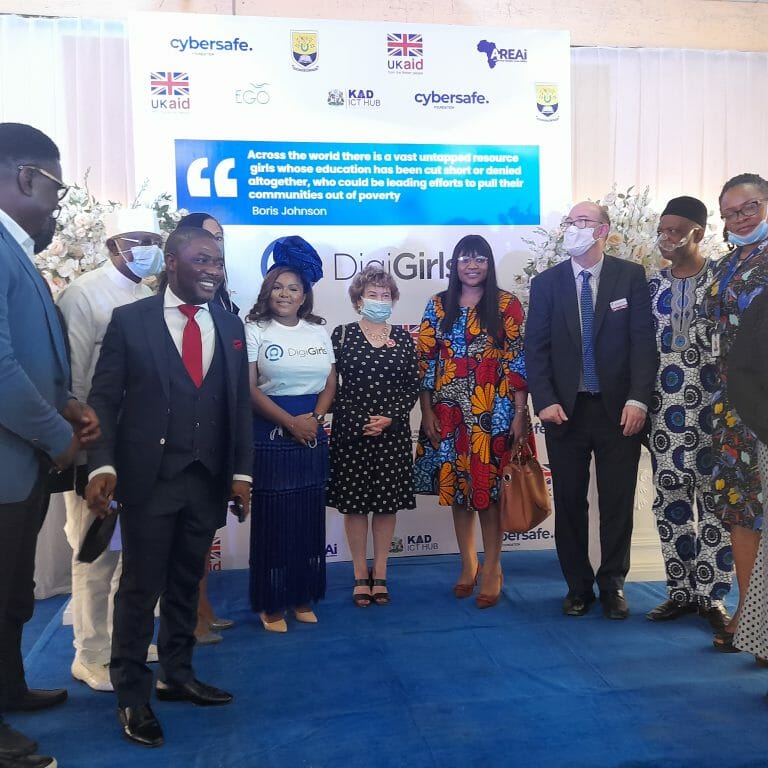With the digital world expanding daily, Cybersafe Foundation has revealed that it would empower 2400 girls with basic digital skills to lower the digital gender divide in Nigeria.
Founder of CyberSafe, Mrs Confidence Staveley, made this known on Wednesday at the official flag-off of DigiGirls in Lagos.
According to Staveley, the empowerment would contribute to ensuring safe and responsible use of the digital and tackle gender-based violence.
Staveley noted that the goal of this program is to close the digital gender gap that is causing unemployment, underemployment of women and girls, especially for the underserved and vulnerable in our communities.
She added that the program will also foster lasting poverty reduction and alleviate tough economic realities for women and girls in Nigeria.
“Across the world there is a vast untapped resource – girls whose education has been cut short or denied altogether, who could be leading efforts to pull their communities out of poverty.
‘’Those are the words of Boris Johnson, the British Prime Minister, at Cybersafe Foundation.
‘’We could not agree more with him, and as we continue working to ensure inclusive and safe digital access across Africa, we are super excited to be implementing the DigiGirls Project, enabled by the commitment and funding from the UK Government.
‘’Lowering the digital gender divide in Nigeria has become a matter of urgency; a recent USAID report shows that over 90 per cent of jobs worldwide have a digital component, and without these skills, women are automatically disadvantaged and do not have the confidence to participate in the digital workforce,’’ she said.
Staveley added that in a few days of opening applications for this programme, the foundation have received over 12,000 signups, proof that DigiGirls is a timely and much-needed intervention.
‘’Sadly, we could only accept 2400 of these women and girls across Nigeria, with only 10% learning on-site in our Lagos and Kaduna hubs,’’ she said.
Those attending the programme will be provided free basic to intermediate digital skills and soft skills training, mentorship, internship and job placement, Staveley assured.
The Federal College of Education (Technical) Akoka, and KAD ICT hub were appreciated for providing on-site learning facilities with the UK Government also receiving accolades for co-designing and funding the DigiGirls programme through its the Digital Access Programme.
Also speaking at the occasion, British High Commissioner in Nigeria, Catriona Laing, said that UK was committed to being a global science and technology partner, working with others to develop solutions to the world’s most pressing challenges, including on digital skills.
Laing said in Nigeria, science, tech and innovation provided opportunities for sustainable economic transformation – not least through the dynamic tech sector.
She said that UK firmly believed in the future growth story of Nigeria’s digital sector as currently the ICT sector contributes about 15 per cent to Nigeria’s GDP, and certainly more than oil.
According to her, to continue to drive this growth, Nigeria needs a combination of: increased access to affordable, faster and better quality internet, an encouraging regulatory environment, a skilled talent pool, and access to investment and partnership opportunities.
The high commission reflected on some ongoing work such as UK working with the Nigerian government to promote Nigeria’s digital economy and drive this growth.
Laing said it would be through Digital Access Programme, the UK-Nigeria Tech Hub Network and the West Africa Research and Innovation Hub, among others.
While appreciated the 2400 girls for taken the advantage of the training, she said that the programme would address the digital inequalities in Nigeria which currently stands at 15 per cent gender gap against women.
DigiGirls is an initiative of Cybersafe Foundation funded by the United Kingdom government through its Foreign Development and Commonwealth Office (FDCO).
